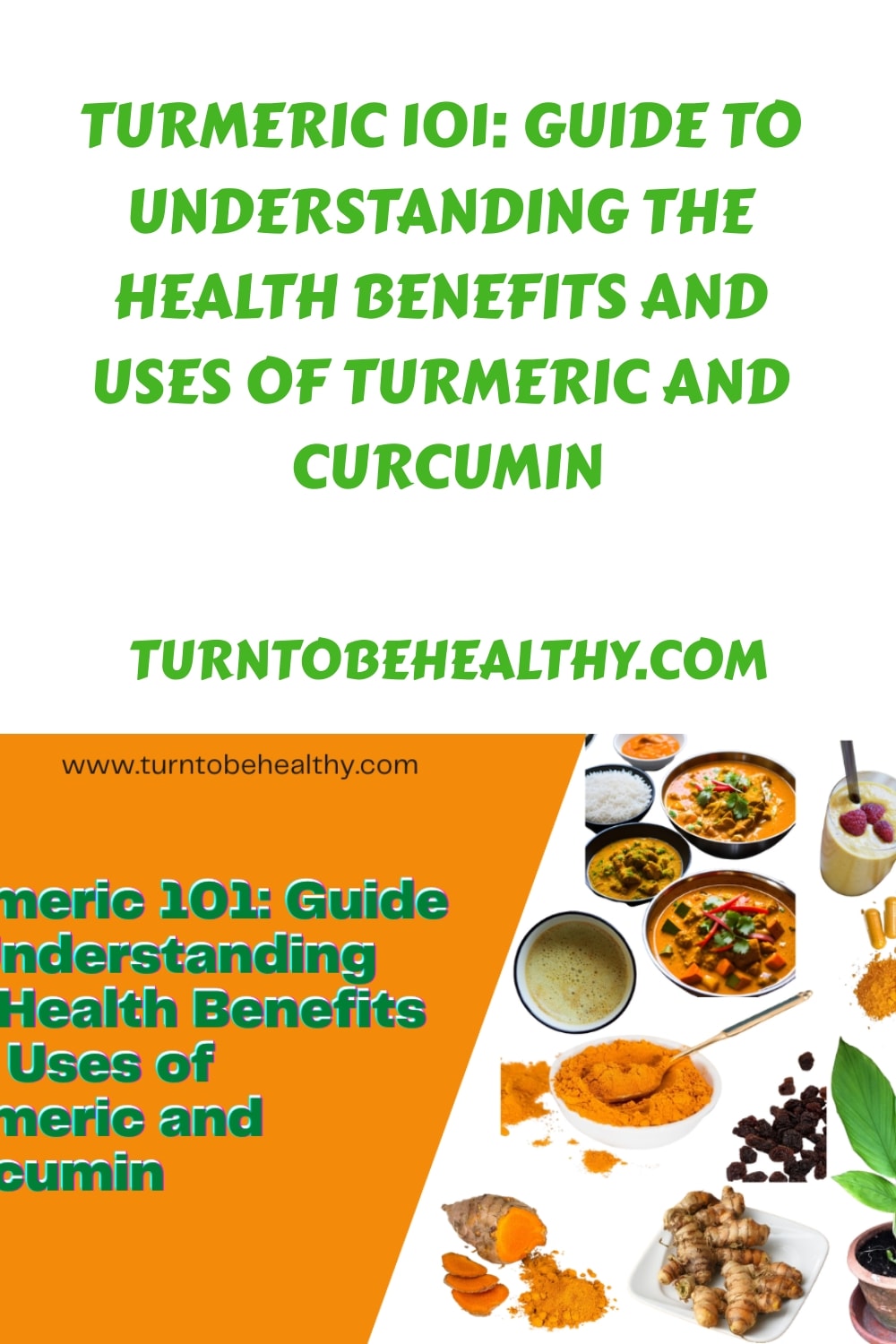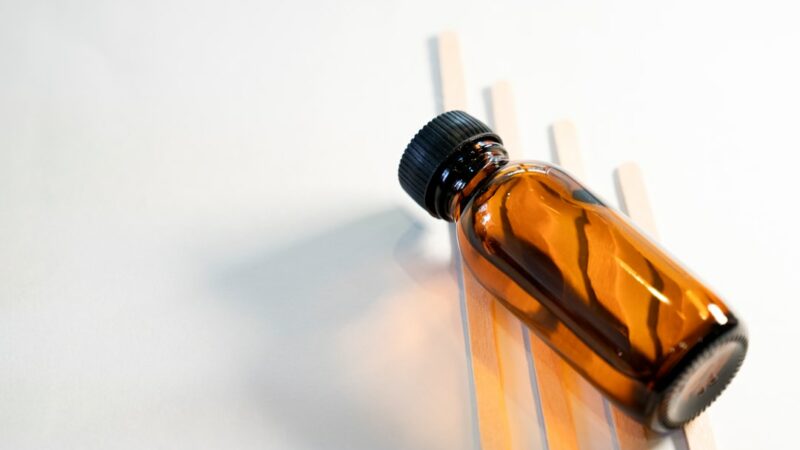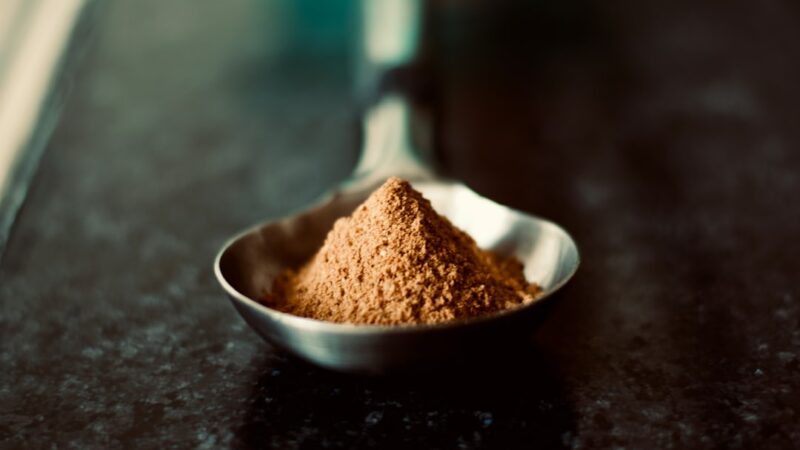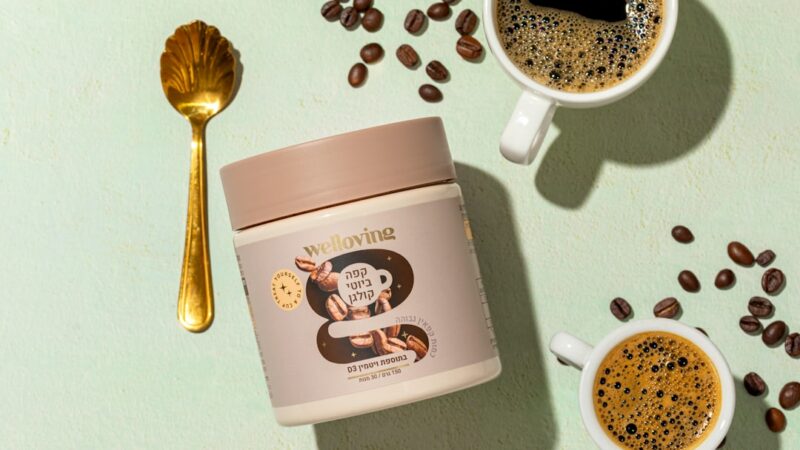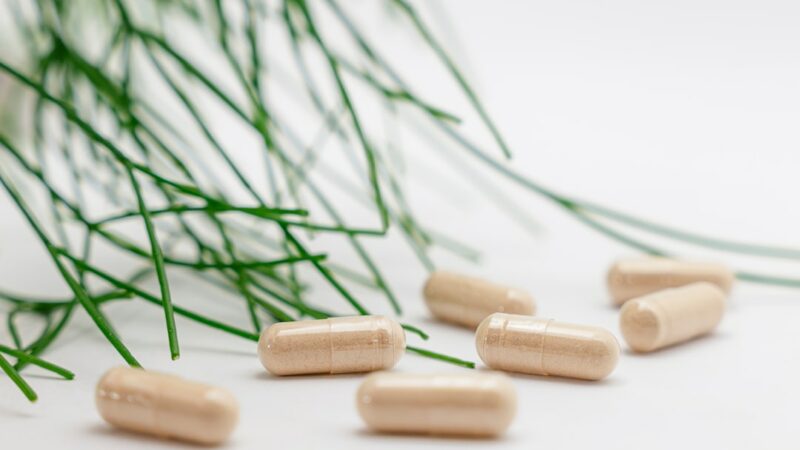Turmeric 101: Guide to Understanding the Health Benefits and Uses of Turmeric and Curcumin
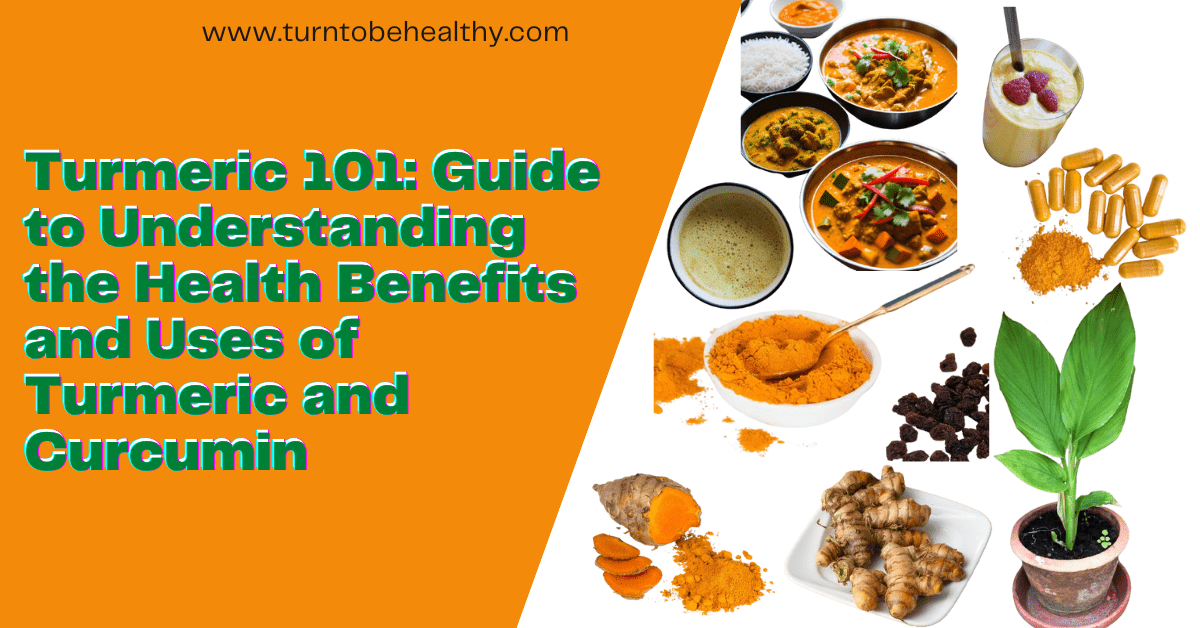
Are you curious about turmeric and its many uses? Look no further than this guide! From cooking to skincare, this versatile spice offers a range of health benefits. The curcumin is packed with powerful antioxidants and anti-inflammatory compounds to elevate your health.
Turmeric, the vibrant yellow spice that adds flavor and color to dishes from around the world, has been used for centuries as a natural remedy for a variety of ailments. This spice is making a comeback in modern times as a powerful natural remedy.
But did you know that turmeric is also packed with powerful antioxidants and anti-inflammatory compounds? In this comprehensive guide, we will explore the science behind turmeric, its many benefits, the incorporation of turmeric into one’s diet, and how you can incorporate this ancient spice into your daily routine for optimal health.
Whether you’re a seasoned spice lover or new to the world of turmeric, this guide is a must-read for anyone looking to understand its power.
Table of Contents
Definition and brief history of turmeric
Turmeric, also known as the “golden spice,” is a staple ingredient in many cuisines around the world. It adds a vibrant yellow color and a unique, warm flavor to dishes. However, turmeric is not just used for culinary purposes; it has been used for centuries in traditional medicine for its healing properties. In recent years, science has begun to uncover the many therapeutic effects of this ancient spice.
Turmeric is a perennial herb that belongs to the ginger family. It is native to tropical regions of Southeast Asia and is grown for its root, which is used as a spice and a natural remedy. The root of the turmeric plant is dried and ground into a powder, which is used as a seasoning and a colorant in food, as well as a natural dye.
Turmeric has been used for thousands of years in traditional medicine in India, China, and other parts of Southeast Asia. It was used to treat a variety of ailments, including skin conditions, digestive problems, and joint pain. Its uses spread to the Middle East and Africa, and eventually to Europe. Today, turmeric is used in both traditional and modern medicine and is widely available in supplement form, as well as in cooking.
What is Turmeric
Turmeric is a spice that comes from the root of the turmeric plant. It is commonly used in cooking and is known for its bright yellow color and distinct, earthy flavor. Rhizomatous herbaceous perennial plant and belongs to the ginger family. It is a spice made from the ground roots of a plant and is available commercially. It is also used in traditional medicine and has been used for thousands of years in Ayurvedic and Chinese medicine to treat a variety of ailments.
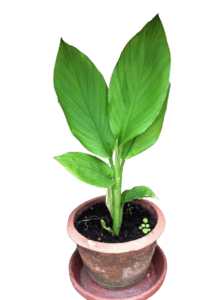
Turmeric contains a compound called curcumin, which is believed to be responsible for many of its medicinal properties. Curcumin is a powerful antioxidant and anti-inflammatory agent and is thought to help with conditions such as arthritis, heart disease, and cancer.
The National Center for Complementary and Integrative Health (NCCIH), a part of the National Institutes of Health (NIH), states that there is some scientific evidence to support the utilization of
turmeric for certain health conditions, but more research is needed to confirm its effectiveness. They also state that turmeric supplements have been used safely in some studies for up to 8 months. However, as with any supplement, it is important to speak with a healthcare provider before starting to take it.
Anti-inflammatory Properties
Turmeric contains a compound called curcumin, which has been shown to have anti-inflammatory effects. This can help to alleviate symptoms of conditions such as rheumatoid arthritis, osteoarthritis, and inflammatory bowel disease.
Antioxidant Properties
Curcumin is also a powerful antioxidant, which helps to protect the body against damage from free radicals. This can help to reduce the risk of chronic diseases such as cancer and heart disease.
Brain Health
Studies have shown that curcumin may have a positive effect on brain function, including memory and cognitive function. It has been found to have the potential to improve brain health by increasing the growth of new brain cells and improving the function of existing ones.
Heart health
Curcumin has been found to have a beneficial effect on heart health by reducing the risk of heart disease. Studies have shown that it may help to lower cholesterol levels, and blood pressure, and prevent the formation of blood clots.
Digestive Health
Turmeric may help to improve digestive health by reducing inflammation in the gut and promoting the growth of healthy gut bacteria. It can help alleviate symptoms of conditions such as ulcerative colitis, irritable bowel syndrome, and other digestive issues.
Cancer prevention
Curcumin has been found to have potential anti-cancer properties, and studies have shown that it may help to reduce the risk of certain types of cancer. It may also slow the growth and spread of cancer cells.
Skin health
Turmeric has been used in traditional medicine to treat skin conditions such as eczema, psoriasis, and acne. Its anti-inflammatory and antioxidant properties may help to reduce inflammation and protect the skin against damage.
Scientific Evidence of the Effects of Curcumin on Human Health
- Turmeric
- Turmeric is a rhizomatous herbaceous perennial plant of the ginger family that has been traditionally used in Asian countries for its medicinal properties, including its antioxidant, anti-inflammatory, antimutagenic, antimicrobial, and anticancer properties.
- Curcumin is the main natural polyphenol found in turmeric and has been investigated for its mechanisms of action and bioactive components.
- Curcumin
- Used as an active ingredient for medicinal preparations and finds regular use in Ayurveda and Chinese medicine.
- Available in several forms and used in daily activities.
- Curcumin has multiple healing properties due to its antioxidant and anti-inflammatory effects and has been shown to benefit inflammatory conditions, metabolic syndrome, pain, and degenerative eye conditions.
- The major problem with ingesting curcumin by itself is its poor bioavailability, which can be improved by adding agents such as piperine that enhance bioavailability.
- Curcumin is being used in many different forms for multiple potential medicinal benefits and has good tolerability and safety profiles even at high doses.
- Low bioavailability due to its hydrophobic nature after oral administration.
- Categorized as a Generally Recognized as Safe (GRAS) material.
- Provides immense benefits to patients when used as a tonic for various diseases.
- Mechanisms of Action
a. Antioxidant
- Curcumin has been shown to improve systemic markers of oxidative stress, increase serum activities of antioxidants, and scavenge different forms of free radicals.
- Its effect on free radicals is carried out by several different mechanisms, making it an efficient scavenger of peroxyl radicals.
b. Anti-Inflammatory
- Curcumin has been shown to suppress inflammation through many different mechanisms and can downregulate NF-κB activation increased by several different inflammatory stimuli.
- Inflammation has been identified in the development of many chronic diseases and conditions, and curcumin has potential efficacy against several of these diseases.
- Arthritis Osteoarthritis (OA) affects over 250 million people worldwide and is now recognized as having inflammatory aspects. Several studies have shown the anti-arthritic effects of curcumin in humans with OA and rheumatoid arthritis (RA). In randomized controlled trials, curcumin was found to significantly reduce pain, physical function, and stiffness scores, decrease systemic oxidative stress, and decrease markers of inflammation in OA patients. Curcumin was also found to be as effective as ibuprofen in reducing arthritis symptoms and may offer an alternative to NSAIDs for patients with OA seeking treatment but experiencing negative side effects. A recent systematic review and meta-analysis recommended turmeric extracts and curcumin for alleviating the symptoms of arthritis, especially OA.
- I. Metabolic Syndrome
- Curcumin can improve insulin sensitivity, suppress adipogenesis, and reduce inflammation, oxidative stress, and blood pressure in people with Metabolic Syndrome (MetS)
- Curcuminoids can modulate lipoprotein metabolism, leading to reduced plasma triglycerides and cholesterol and increased HDL-C
- Curcumin supplementation significantly decreases serum concentrations of pro-inflammatory cytokines in MetS patients and improves oxidative and inflammatory status II.
- Healthy People
- Low-dose curcumin can provide healing properties for healthy people, including lowering Triglyceride levels, Increasing Nitrous Oxide, reducing Stress Markers, and improving Cognitive Function and Mood.
- Combining curcumin with other agents, such as Boswellia serrata, can have positive effects on Glycoxidation and Lipid Peroxidation.
- Curcumin can help reduce Inflammation and Muscle Soreness in healthy people after exercise.
- Curcumin can potentially have Anti-Anxiety Effects in healthy Obese people.
- Safety and Allowable Daily Intake
- Curcumin has a well-established safety record, with an Allowable Daily Intake (ADI) value of 0-3 mg/kg body weight.
- Reported Side Effects Although curcumin is generally safe, some negative side effects have been reported, such as diarrhea, headache, rash, and yellow stool.
- Health advantages of Curcumin
It has multiple medicinal benefits, including:
- Management of oxidative and inflammatory conditions
- Metabolic syndrome
- Arthritis
- Anxiety
- Hyperlipidemia
- Exercise-induced inflammation
- Muscle soreness
- Dyslipidaemia
- Hepatic diseases
These benefits are best achieved when curcumin is combined with agents such as piperine, which increases its bioavailability significantly. Even a relatively low dose can provide positive health outcomes for people who do not have diagnosed health conditions.
Curcumin: A Study Review of Its Effects on Human Health and Different Types of Cancers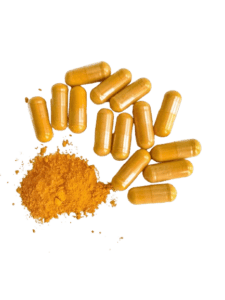
Turmeric and its ingredients have been recognized as multitargeted phytochemicals in cancer treatment, as they affect cell functions such as apoptosis, autophagy, and cell cycle arrest. The use of turmeric has been linked to various signaling pathways, such as p53, Ras, phosphoinositide 3-kinase, AKT, Wnt/β-catenin, and mammalian target of rapamycin, which are known to be the anticancer targets of curcumin, as documented by various authors.
a. Colorectal Cancer (CRC)
It is a natural substance found in turmeric. Curcumin may help prevent colorectal cancer in people who are overweight. It works by activating a protein called AMP-activated kinase, which reduces the amount of COX-2 protein in the colon lining. This can prevent a protein called nuclear factor-κB (NF-κB) from causing damage to the colon. Curcumin also lowers levels of a hormone called leptin and increases a protein called adiponectin, which can also protect against colorectal cancer.
b. Renal Cancer
Studies have shown that curcumin may be able to help treat kidney cancer. When human kidney cells were exposed to curcumin, they began to change in ways that caused them to die. At certain concentrations, curcumin can even make the cells grow bigger before they die. Curcumin has also been shown to make colorectal cancer cells die and stop growing.
c. Hepatic Cancer
Curcumin may be able to help fight liver cancer. It works by targeting a part of the cells called the spindle assembly checkpoint, which is important for cell division. By affecting this checkpoint, curcumin can cause the cells to die. This happens when a protein called cell division cycle 27 (CDC27) becomes more active in the cells.
d. Bone Cancer
Curcumin has been studied for its ability to fight bone cancer. It is very effective at stopping cancer cells from growing and reducing inflammation. However, it is hard for the body to absorb curcumin because it does not dissolve well in water. Scientists have found a way to make a form of curcumin that dissolves better in water, which could make it more effective against bone cancer.
e. Blood and Other Cancers
Curcumin may also help fight other types of cancer, including blood cancer. It works by stopping cells from growing and causing them to die. Curcumin can also affect proteins that help cells divide, which can lead to cell death. This happens because curcumin can affect how the cells’ mitochondria work, which is important for cell survival. By disrupting the mitochondria, curcumin can cause the cells to die.
ANTIOXIDANT AND ANTI-INFLAMMATORY PROPERTIES
Curcumin improves systemic markers of oxidative stress, scavenges different forms of free radicals, and is considered a chain-breaking antioxidant.
It suppresses inflammation through many different mechanisms and shows anti-arthritic effects in humans with osteoarthritis and rheumatoid arthritis.
Curcumin attenuates several aspects of metabolic syndrome.
Curcumin has a long-established safety record.
Reported side effects include nausea, diarrhea, and an increase in serum alkaline phosphatase and lactate dehydrogenase levels.
a. ARTHRITIS
Curcumin shows anti-arthritic effects in humans with osteoarthritis and rheumatoid arthritis.
Standardized turmeric extracts (1000 mg/day) are beneficial in reducing arthritis symptoms.
b. METABOLIC SYNDROME
Curcumin improves insulin sensitivity, suppresses adipogenesis, decreases blood pressure, inflammation, and oxidative stress, and attenuates several aspects of metabolic syndrome.
c. SIDE EFFECTS
Curcumin has a long-established safety record with an allowable daily intake (ADI) of 0-3 mg/kg body weight.
Reported side effects include:
- Diarrhea
- Headache
- Rash
- Yellow stool
High doses of curcumin (500-12,000 mg) may cause nausea and diarrhea and increase serum alkaline phosphatase and lactate dehydrogenase levels.
It has a long history of use for its health benefits and is regularly used in the treatment of various diseases.
Its use can be further encouraged as an alternative to allopathic medicines with proper protocols and patient selection.
Potential Advantages of Turmeric Consumption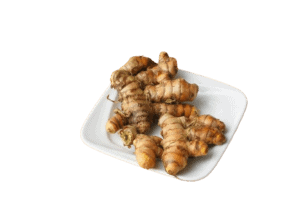
The health benefits of turmeric are numerous and have been widely researched, with numerous studies indicating a variety of potential applications. For those seeking to take turmeric to support their well-being, including individuals with specific health concerns, the active ingredient in turmeric – curcumin – is of particular interest. Some studies suggest that curcumin may have a range of positive impacts on various health conditions.
Turmeric and Curcumin: A Powerful Combination
The combination of turmeric and curcumin offers a wide array of potential benefits for those interested in natural remedies. It is important to note that the effect of turmeric is closely tied to the presence of curcumin, which contributes to the majority of its health-promoting properties. By using a curcumin supplement, one can effectively harness the benefits of turmeric and curcumin, further enhancing their potential health advantages.
Enhancing Turmeric Absorption
To fully experience the health benefits of turmeric, it is essential to improve its bioavailability. One way to achieve this is by combining it with black pepper, which contains a compound that significantly increases the absorption of curcumin. When consuming the turmeric root or taking a curcumin supplement, consider adding black pepper to your regimen to maximize the impact of these powerful compounds.
Optimal Dosage Recommendations
The appropriate amounts of turmeric and grams of curcumin can vary depending on individual needs and health goals. To determine the optimal dosage for your specific situation, consult with a healthcare professional who can assess your unique requirements and provide tailored recommendations based on the latest research.
Curcumin Inhibits Inflammation
One of the most well-known benefits of turmeric and curcumin is its ability to reduce inflammation in the body. This anti-inflammatory effect of curcumin may be beneficial for individuals dealing with conditions such as arthritis or other inflammatory disorders. Studies suggest that curcumin inhibits inflammation by blocking certain enzymes and molecules that contribute to the inflammatory response.
Benefits of Turmeric and Curcumin for Specific Health Conditions
While the health benefits of turmeric and curcumin are numerous, specific benefits may vary depending on individual health concerns. Research suggests that curcumin may help prevent certain types of cancer, support heart health, and improve brain function. For those dealing with digestive issues, turmeric may be particularly beneficial due to its ability to support digestive health and alleviate symptoms such as bloating and gas.
Using Turmeric for Health: Methods and Benefits
Individuals seeking alternative solutions for their health concerns can use turmeric as a natural remedy, thanks to its active substance, curcumin. Incorporating turmeric in food or taking turmeric supplements can provide numerous benefits. Studies show that turmeric use can lead to improvements in various health conditions, with the Japanese turmeric root being particularly popular.
Curcumin and Active Health Conditions
Curcumin in patients with active health conditions may require additional considerations. Before starting curcumin for the treatment of any ailment, it is crucial to consult a healthcare professional to ensure its safety and efficacy.
10 Ways Turmeric Can Improve Health
The efficacy of turmeric is primarily attributed to its active ingredient, curcumin. Turmeric is likely to offer a range of benefits, including antioxidant, anti-inflammatory, and antidepressant-like effects. Curcumin in supplement form is often combined with piperine, a component of black pepper called piperine, to enhance absorption.
To use turmeric for optimal health benefits, one can incorporate it into their daily diet or opt for a turmeric extract or curcumin supplement. The top 10 health benefits of turmeric include its potential to reduce inflammation, improve brain function, and alleviate symptoms of various health conditions.
Curcumin Treatment and Safety
The safety of curcumin in patients has been demonstrated in numerous studies, indicating that large amounts of turmeric and curcumin are generally well-tolerated. However, taking more than 4 grams of curcumin daily for an extended period may cause serious side effects. For most individuals, turmeric is safe, but it is crucial to stop using turmeric at least 2 weeks before any surgery.
Potential of Curcumin in Alleviating Health Conditions
The potential of curcumin is vast, as it has been shown to help treat and prevent various ailments. Curcumin induces apoptosis in cancer cells, inhibits proliferation, and may help delay the progression of chronic diseases. Its protective effects also extend to the prevention of cognitive decline and the management of arthritis symptoms.
Turmeric Side Effects and Precautions
While turmeric is commonly used and generally considered safe, it may cause mild side effects in some individuals. It is essential to be cautious when incorporating turmeric into your daily routine and to stop taking turmeric if adverse reactions occur. Turmeric can make certain medications less effective, so it is crucial to consult a healthcare professional before adding it to your regimen.
Making Turmeric a Part of Your Life
To fully benefit from the efficacy and safety of curcumin, one can incorporate turmeric into recipes or opt for a turmeric curcumin supplement. Regardless of the form, turmeric offers numerous benefits, and its use can contribute to overall well-being.
Turmeric and Curcumin: A Powerful Duo
Turmeric contains curcumin, the active ingredient responsible for its numerous health-promoting properties. Curcumin supplements contain concentrated amounts of curcumin to provide optimal benefits. Curcumin and piperine combinations can further enhance the impact of curcumin on the body.
Curcumin Enhances Overall Health
Curcumin enhances the body’s natural defenses by providing antioxidant, anti-inflammatory, and neuroprotective effects. The active substance in turmeric, curcumin, may help treat various ailments and improve overall well-being.
Curcumin’s Impact on Medications
It is essential to be aware of the effects of these medications when using turmeric or curcumin, as they may interact negatively with certain drugs. Consult a healthcare professional before taking curcumin, especially if you are on prescription medications.
Curcumin’s Role in Mental Health
The antidepressant-like effects of curcumin have been observed in various studies, making it a potential alternative for individuals seeking natural remedies for mental health concerns. Curcumin treatment is equally effective as some conventional medications, without causing significant side effects.
Turmeric and the Digestive System
Turmeric has also been used to support digestive health, as it may help alleviate symptoms associated with various gastrointestinal disorders. The efficacy of curcumin in reducing inflammation and promoting gut health makes it an ideal choice for those dealing with digestive issues.
Incorporating Turmeric in Daily Life
To reap the benefits of this potent Indian spice, try incorporating turmeric in recipes, such as curries, soups, and smoothies. Additionally, consider taking a turmeric curcumin supplement to ensure you consume adequate amounts of curcumin daily.
Turmeric and Drug Interactions
Turmeric can help improve overall health, but it is crucial to be aware of its potential interactions with medications. Consult a healthcare professional to ensure the safe use of turmeric, as it may cause negative effects when combined with certain drugs.
Protective Effects of Curcumin
The protective effects of curcumin extend beyond its anti-inflammatory and antioxidant properties. Curcumin may help delay the progression of age-related diseases, support mental health, and promote digestive health. Curcumin is present in turmeric and can be consumed through diet or supplements.
Turmeric for Prevention
Turmeric may help prevent the development of various chronic diseases, thanks to its potent antioxidant and anti-inflammatory properties. Including turmeric in your diet or taking a curcumin supplement can contribute to improved overall health.
Indian Spice Turmeric: Good for Health
The Indian spice turmeric is good for health, offering numerous benefits and few side effects when consumed in moderation. However, it is important to monitor your intake, as excessive amounts of turmeric may cause gastrointestinal issues or interact with medications.
Curcumin’s Role in Cellular Health
Curcumin inhibits proliferation and induces apoptosis in cancer cells, highlighting its potential as a supportive treatment for various cancers. Its anti-cancer properties can be attributed to its ability to modulate cell signaling pathways and reduce inflammation.

